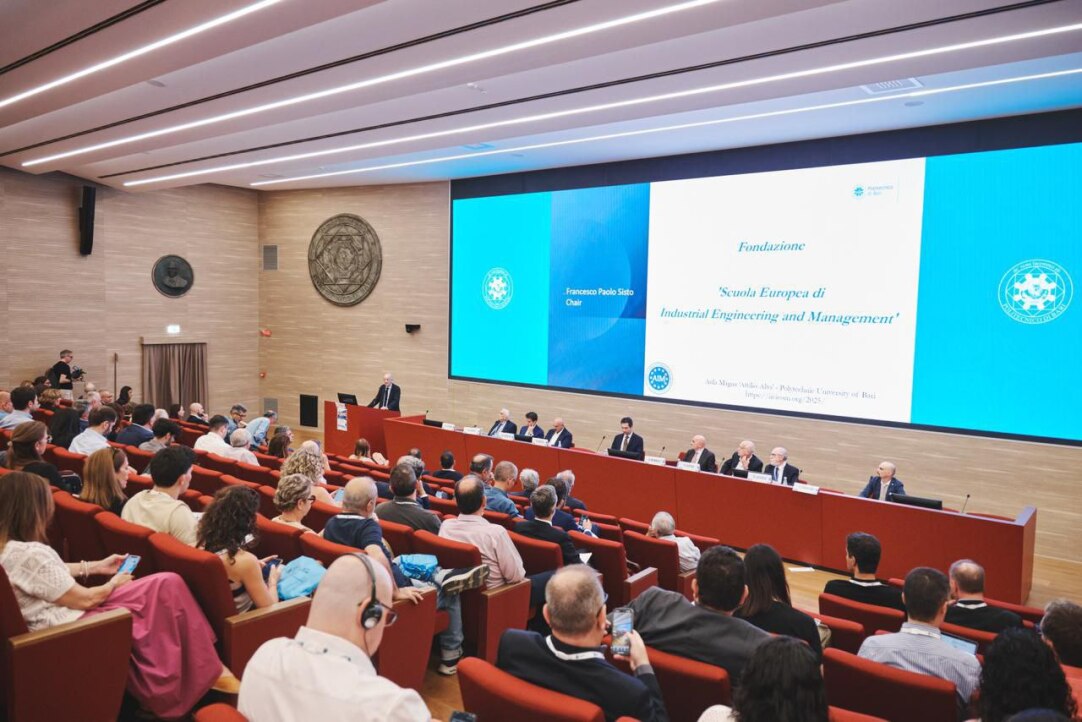Innovation, AI, and International Collaboration: international faculty from GSB present at the 31st IJCIEOM Conference
GSB professors Anja and Zeljko Tekic took part in the 31st International Joint Conference on Industrial Engineering and Operations Management (IJCIEOM), held from June 23 to 25, 2025, at the Polytechnic University of Bari, Italy.

Professors Anja Tekic and Zeljko Tekic from the Graduate School of Business (GSB) recently participated in the 31st International Joint Conference on Industrial Engineering and Operations Management (IJCIEOM) with the support of GSB. From June 23rd to 25th, 2025, the conference was held at the Polytechnic University of Bari, Italy, focusing on the theme “Redesigning industrial systems towards a Sustainable, Resilient, and Human-Centric future in the digital era.” The event brought together researchers, practitioners, and industry leaders from around the world and provided a valuable opportunity for GSB faculty to share their research, engage in meaningful exchanges, and strengthen the school’s connections within the international academic community.
The conference welcomed over 130 participants from 21 countries, with the largest contingents coming from Brazil, Italy, and Portugal. The strong Brazilian presence made the conference not only a valuable academic forum but also a wonderful gateway for connecting with colleagues from Latin America and exploring new avenues for international cooperation.
More than 150 research papers were presented, approximately 70% to be published in Springer Proceedings. The rich program featured 35 parallel sessions, 18 special sessions, two plenary sessions, a web talk, and a “Meet the Editor” session. A significant highlight was the kick-off ceremony of the European School of Industrial Engineering & Management Foundation, highlighting the conference’s longstanding role as a hub for fostering collaboration and knowledge exchange across borders.
Keynote addresses were delivered by distinguished scholars. Prof. Aziz Bouras (Qatar University) shared insights into lifecycle management and digital innovation ecosystems, while Prof. Dr. Torbjørn Netland (ETH Zurich) discussed manufacturing excellence and the transformative potential of digital technologies. Both emphasized how digitalization—and particularly AI—is reshaping the landscape of industrial engineering and operations management.
Amid this vibrant context, both Anja Tekic and Zeljko Tekic actively contributed to the conference, presenting research that resonated strongly with the event’s overarching themes of digital transformation, innovation, and sustainability.
Anja Tekic presented two papers exploring hackathons as dynamic environments for innovation and collaborative problem-solving. Her first paper, “Team Motivation in Hackathons: a Fuzzy-Set Qualitative Comparative Analysis,” examined how various configurations of motivational factors influence team performance. By applying fsQCA methodology, she identified key combinations of intrinsic and extrinsic motivators that drive successful outcomes, offering practical insights for hackathon organizers aiming to foster creativity and engagement.
In her second paper, “Expertise Distance and Problem-Solving Effectiveness in Hackathons,” Anja investigated how cognitive diversity and differences in expertise within teams impact their effectiveness. Her findings highlighted the delicate balance between diversity and cohesion—while diverse expertise can fuel innovative solutions, too great a distance in knowledge or background can hinder collaboration.
Zeljko Tekic contributed two presentations centered on the transformative role of artificial intelligence in modern businesses. His paper, “Unpacking AI Product Success: Identifying and Analyzing Critical Success Factors Using ISM,” explored the critical elements that determine the success of AI-driven products. Using Interpretive Structural Modeling (ISM), he mapped interrelationships among success factors, offering a structured framework to guide practitioners and researchers in managing AI product development.
In his second paper, “Navigating AI-Transformation: A Typology of Companies in the Era of AI,” Zeljko introduced a typology categorizing firms based on their approaches to adopting AI technologies. His analysis shed light on strategic pathways ranging from cautious adopters to aggressive innovators, helping organizations better position themselves in an increasingly AI-driven economy.
Beyond the formal sessions, both Anja and Zeljko engaged in active networking with colleagues, exchanging ideas and exploring possibilities for future collaborations. They also participated in several key activities at the conference, including:
- Discussions around a forthcoming special issue of the Journal of Environmental Management, led by the guest editor present at the event. Conversations focused on the scope of the call for papers, potential contributions from attendees, and editorial perspectives on sustainability and environmental management.
- A session showcasing the CERES project (Circular Economy innovation ecosystems Redesigning Skills), where the project team presented outcomes such as developed Competency Maps and a new Curriculum to support the circular economy transition.
- Research collaboration meetings with peers sharing interests in sustainability, circular economy, and emerging technologies, opening opportunities for future joint projects and deeper academic cooperation.
Taken together, these contributions demonstrate how digitalization, AI, and innovation—key pillars of this year’s IJCIEOM theme—are central to the research pursued by Anja and Zeljko Tekic. Their participation underscores GSB’s dedication to advancing knowledge, enriching teaching, and fostering international collaboration in business, management, and the broader digital and sustainable transformation of industry.

Anja Tekic
Assistant Professor, Department of Strategic and International Management
“I really appreciated the chance to present my research in Bari and get thoughtful feedback from colleagues. The sessions led to meaningful exchanges, and it was inspiring to hear different perspectives on innovation and collaboration. I’m returning with new ideas that could develop into future papers, and also with fresh insights I can bring into my teaching at GSB. Conferences like this are invaluable for expanding our research networks and creating new opportunities for international projects.”

Zeljko Tekic
Professor, Department of Business Informatics
“Being in Bari was a good reminder of how valuable it is to attend conferences in person. The event was well organized, and I enjoyed meeting many researchers for the first time and discussing topics around AI and digitalization. It’s encouraging to bring these experiences back to GSB—not only for potential research collaborations and new publications but also for enriching our classroom discussions and further connecting GSB to the international academic community.”
